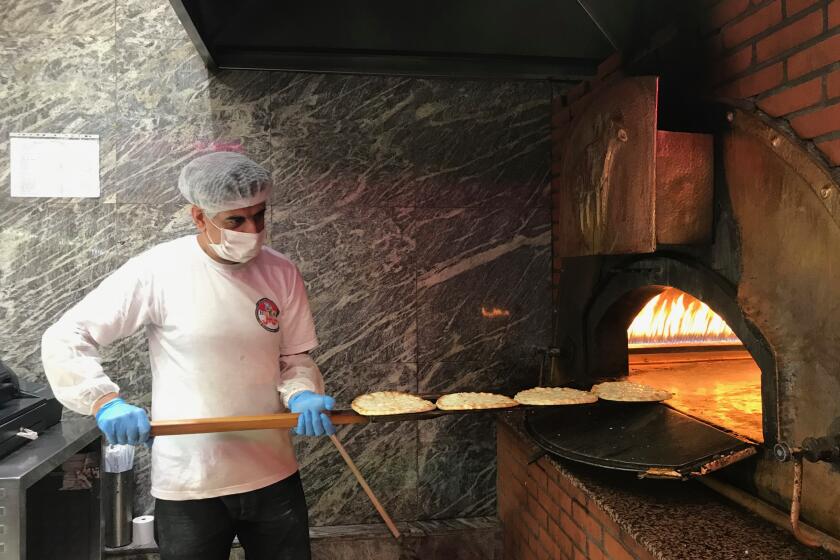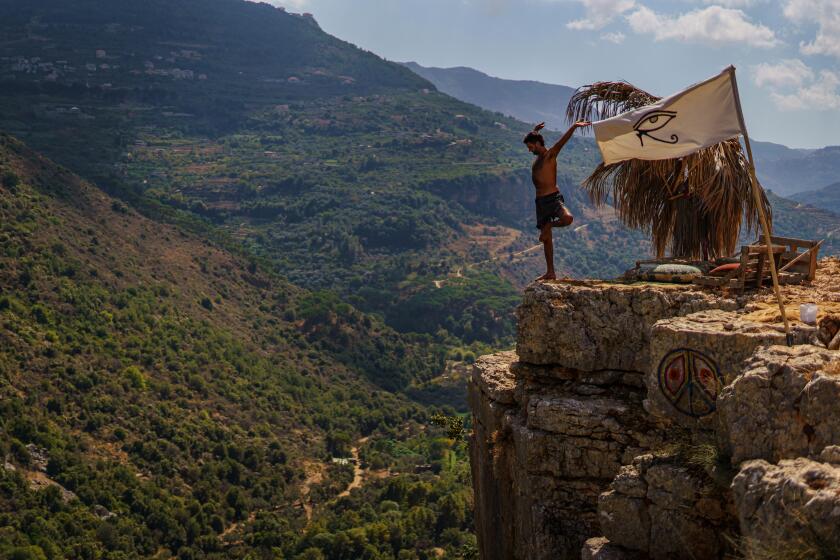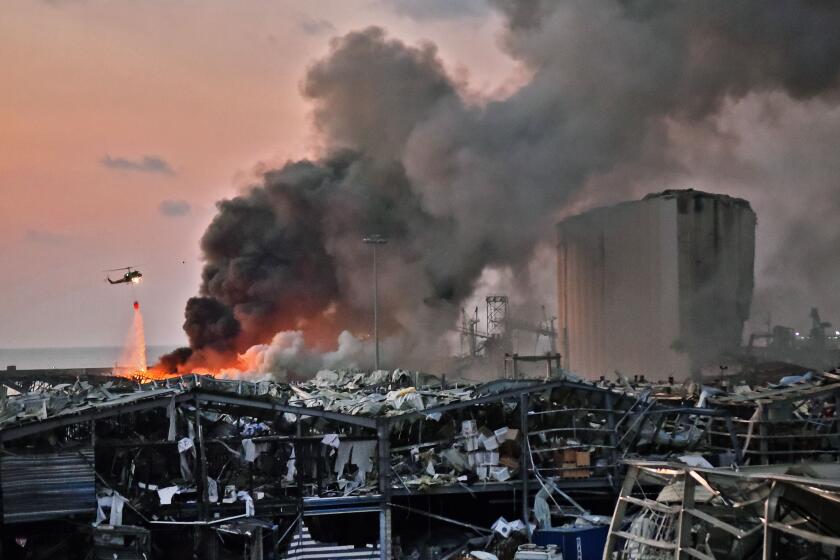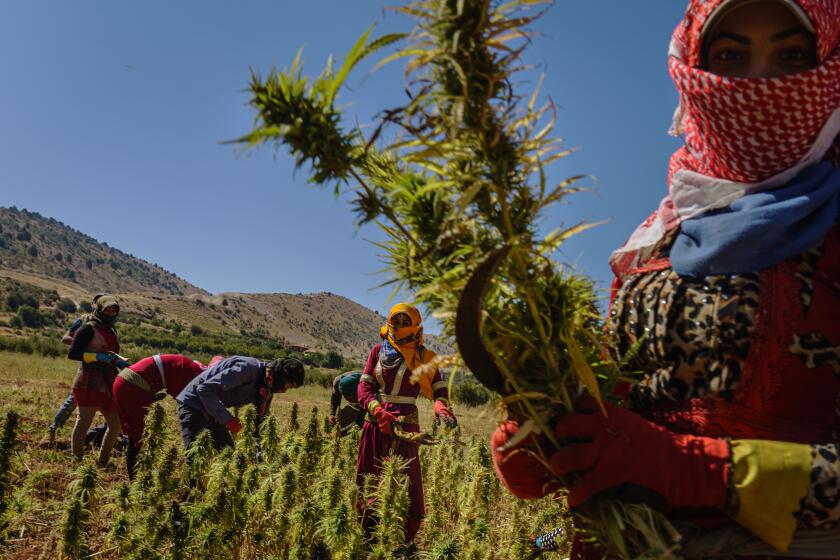Lebanon’s people line up in ‘queues of humiliation’ as their country unravels
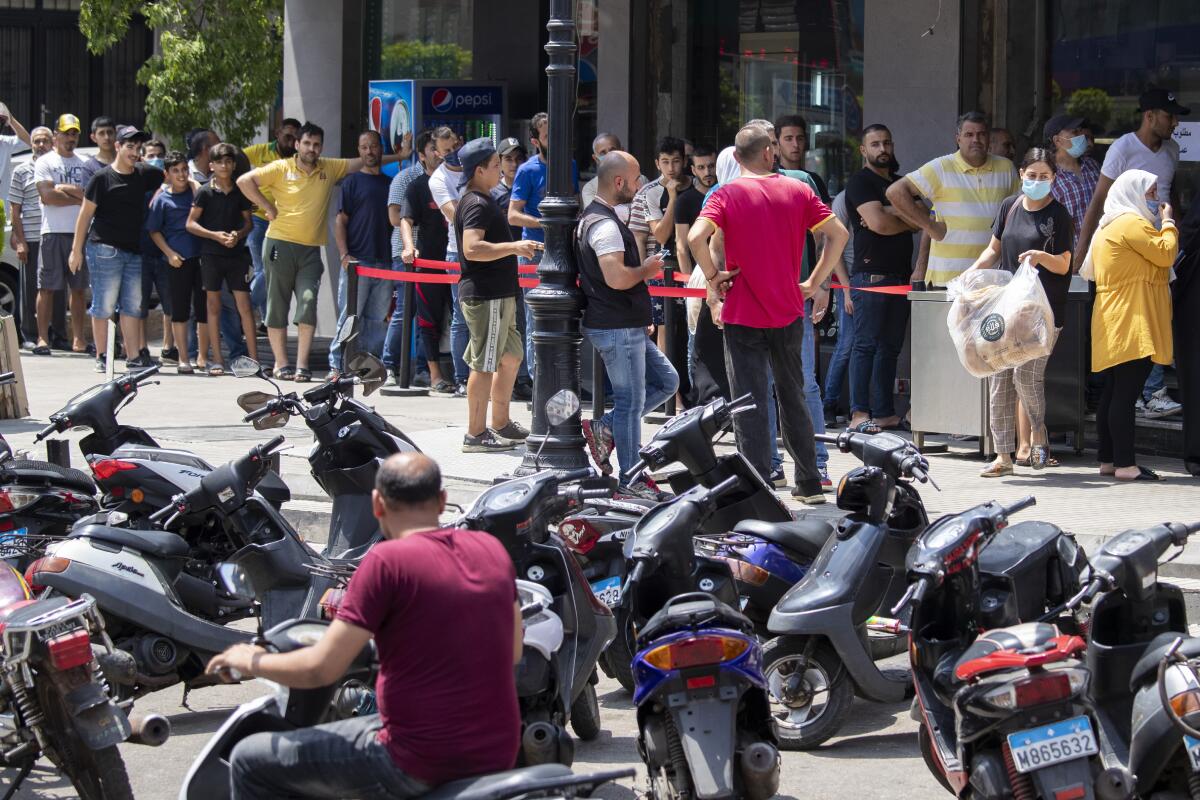
- Share via
BEIRUT — Fill ’er up? Be ready to wait in line at least an hour — assuming the gas station is open, that is.
Need medication? Something as basic as aspirin could set you on a daylong hunt from pharmacy to pharmacy.
Even a grocery run is an ever-accelerating race against ballooning prices and a failing currency. And whatever you do, you’ll need to time it around power cuts that can last up to 23 hours a day.
This is life in Lebanon these days, where a 21-month-long, government-engineered economic implosion — the World Bank calls it “a deliberate depression” — has transformed everyday tasks into a gantlet of fuel, power, water, medicine and basic goods shortages that residents dub tawabeer al-thul, or “queues of humiliation.”
Those lines stretched long this week as the country geared up to celebrate Eid al-Adha, a festival during which Muslims sacrifice a sheep to commemorate Abraham almost sacrificing his son Ismail at God’s command. With the Lebanese lira’s street value down to less than 10% of its official value against the dollar, it’s a ritual few can afford.
“Every month it’s getting worse, so long as the dollar [rate] gets worse,” said Abbass Ismail, a 37-year-old computer repairman trudging home from Beirut’s Sabra market on the eve of Eid.
The Lebanese are used to eating plenty of meat, but the country’s economic woes have made it a luxury as rampant inflation takes its toll.
“This cost 100,000 lira,” he said, looking down at his four stuffed grocery bags. At the official exchange rate, that would have been $66. In reality, it’s about $4.50. Even then, “not everyone has this kind of money to spend. I don’t think there’s Eid. It’s only Eid for the haves.”
It was little better across town in Hamra, an upscale neighborhood with a usually bustling shopping thoroughfare.
“The days when people used to buy in large amounts, that’s gone,” said Sarah, an employee at a traditional sweets shop, who gave only her first name. The store had extended its hours to allow for Eid shoppers, she said, “but even if we stay open till 3 a.m., it won’t matter.”
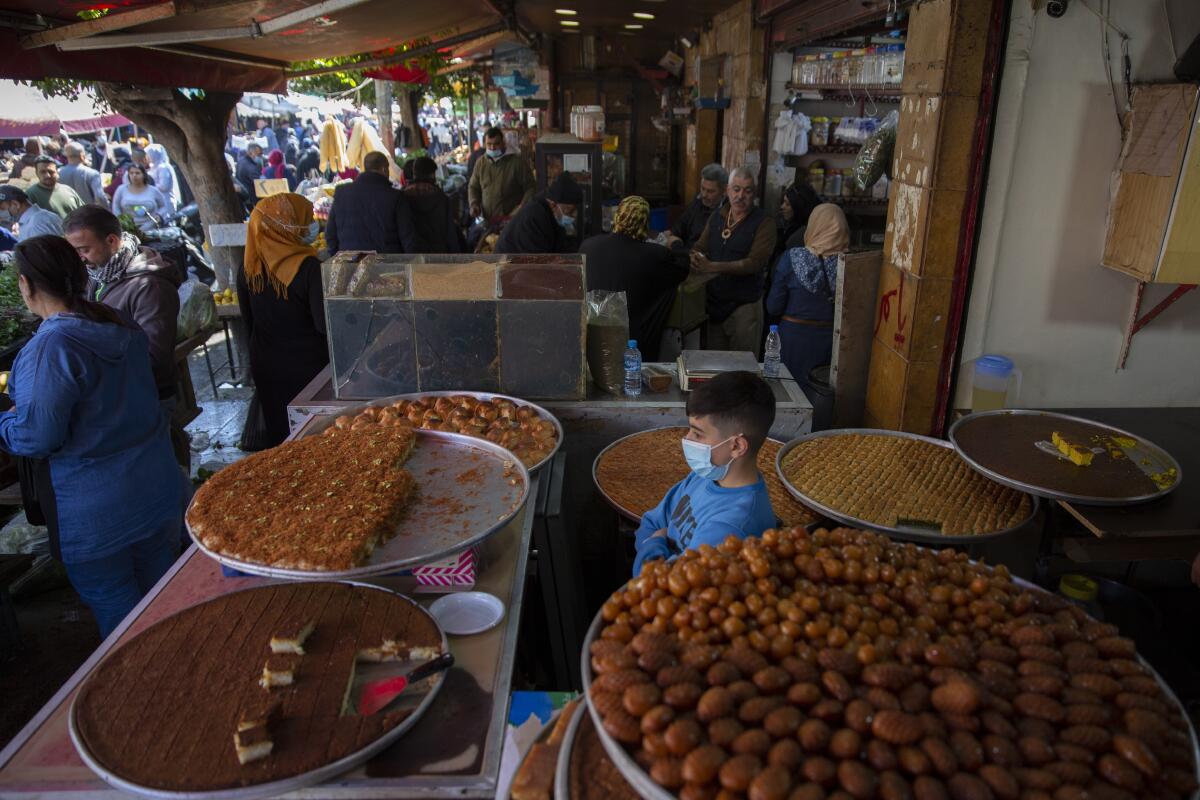
Behind Lebanon’s financial crisis is a power-sharing political system that in 1990 corralled the country’s dizzying mix of sects and loyalties into ending the 15-year civil war. But it turned governance into a patronage game: Instead of rebuilding the country’s ravaged infrastructure, warlords-turned-statesmen used ministries as personal piggy banks to hand out favors to their allies.
The international community spoke vaguely of corruption but continued to pour aid into Lebanon with little regard for how it was spent. Girding everything was a once-inviolable currency peg that kept the lira at 1,507.50 to the greenback.
By 2019, after years of so-called financial engineering by Lebanon’s central bank — which tried to lure dollars from abroad with astronomical interest rates, in what critics likened to a Ponzi scheme — and a series of crises that constricted the flow of dollars into the country, the system crashed.
The government says a dam is necessary to provide drinking water in an era of rising temperatures and climate change. Activists say it’s another corrupt government project.
Banks stopped giving out money, instantly pauperizing hundreds of thousands of Lebanese, who couldn’t access their accounts even as they watched the value of their savings wither away. Angry protests drew a full quarter of the population onto the streets. Coronavirus lockdowns compounded the problem of what had become a cash economy with no way to get cash.
The coup de grâce came last August, when a cache of improperly stored explosive materials in Beirut’s port blew up, killing some 200 people and ravaging entire neighborhoods. The government immediately resigned; politicians have yet to form another ruling coalition, or to assign blame for the blast.
Since then, the country has unraveled to the point that traffic lights no longer function because the government hasn’t paid to repair them. Air conditioning and even some of the lights at Beirut’s airport have been turned off to conserve fuel. The price of flatbread, an essential staple, has been raised eight times this year.
Meanwhile, the army has gone vegetarian because it can no longer afford meat in its soldiers’ rations. It recently started offering civilians $150 joyrides on a Robinson R44 training helicopter to be able to pay for maintenance for its fleet.
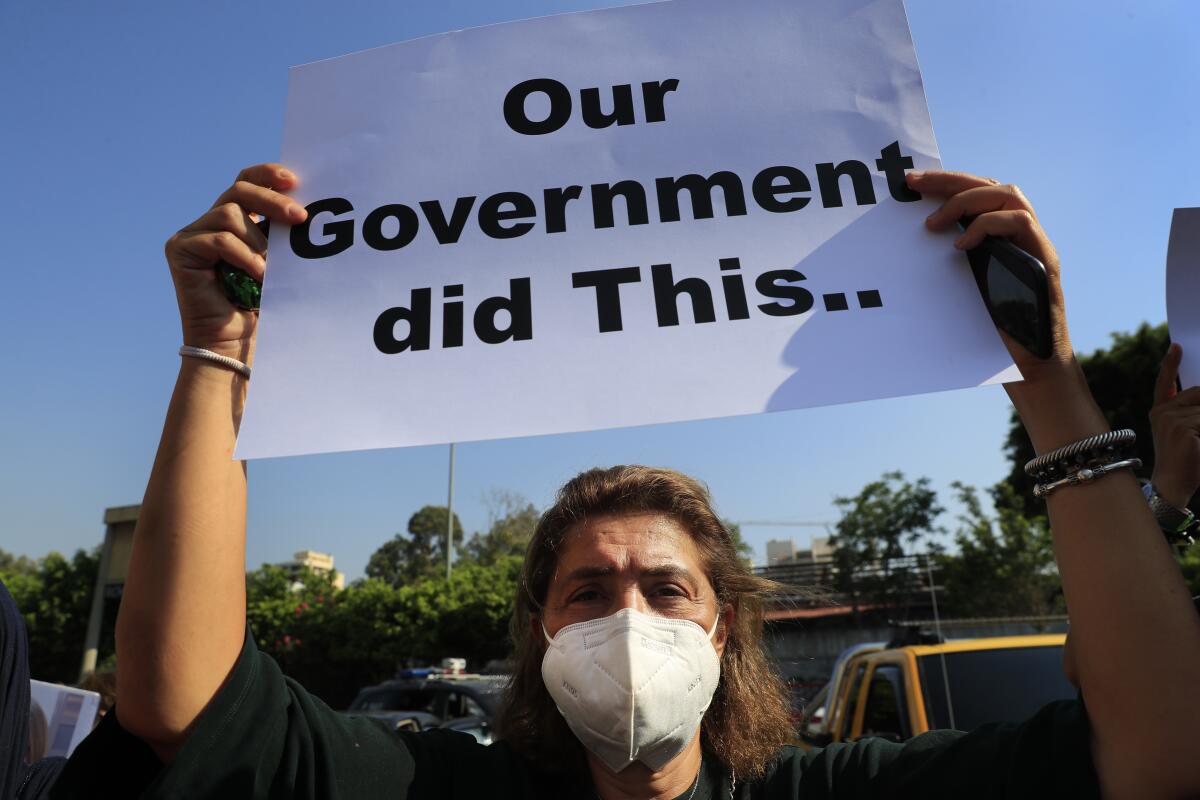
International offers of aid have made formation of a new government a condition of any bailout. But officials have done little more than enact temporary fixes while deflecting blame for decades of mismanagement.
Last week, Prime Minister-designate Saad Hariri gave up on the premiership after failing to agree on a Cabinet with other government leaders, plunging the lira to 22,000 against the dollar on the black market. That brought Lebanon’s minimum wage to the equivalent of $29 per month — the world’s lowest, according to CARE, an anti-poverty humanitarian agency.
“Lebanon’s political class has squandered the last nine months. The Lebanese economy is in free-fall, and the current government is not providing basic services in a reliable fashion,” U.S. Secretary of State Antony J. Blinken said last week after Hariri’s resignation. “Leaders in Beirut must urgently put aside partisan differences and form a government that serves the Lebanese people. That is what the people of Lebanon desperately need.”
Los Angeles Times reporter Nabih Bulos was less than 500 yards from the center of the massive explosion in Beirut. He lived to tell the tale
That desperation isn’t always obvious. Lebanon’s seaside resorts are booked till summer’s end. Upscale restaurants and cafes are overcrowded, as if in affirmation of the Lebanese cliche of partying while the world burns. Sellers of luxury items — including artwork and bespoke motorcycles — say they’ve never seen such business.
But much of it is an illusion buoyed by the Lebanese expatriates who have come home for the summer with dollars from abroad as well as by local residents racing to spend what money they have before it completely loses value. Besides, banks have restricted account holders from spending any of their deposits abroad; domestic expenditure is also restricted, though to a lesser extent.
“The sector is operating at a 70% loss,” said Tony Ramy, head of an association representing members of the hospitality industry, adding that, although prices have rocketed, real value has fallen.
“A drink that used to cost $15 now costs $3. A $60 cover charge is now $20. It’s like we’re holding a fire sale,” he said.
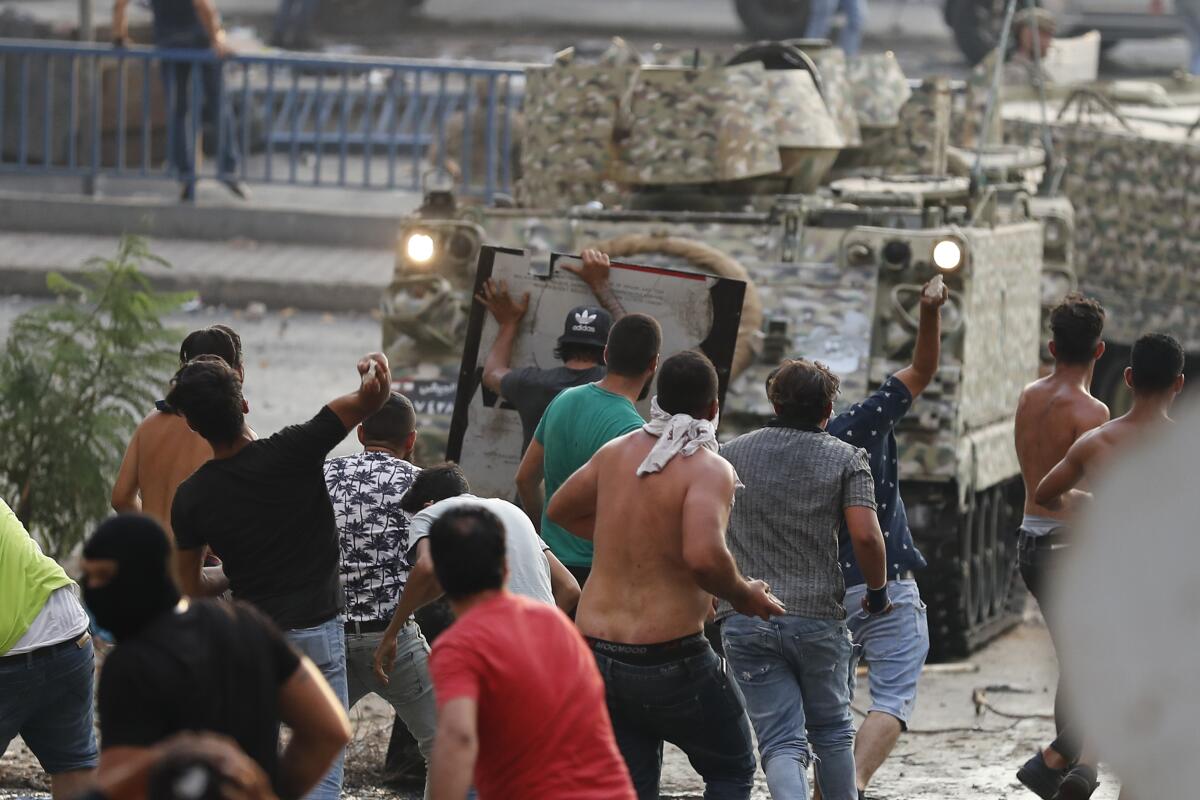
About 90% of Lebanon’s needs are supplied from abroad — grain, medicine, baby clothes, sanitary pads, spare parts for machinery — which the country, and its people, increasingly can’t afford. The price of food and beverages has shot up 670% between April 2019 and April 2021, and more than half of Lebanese have fallen into poverty, with 1 in 6 receiving assistance, said Abeer Etefa, the World Food Program’s Middle East spokeswoman.
Gasoline and diesel are perhaps emblematic of the perfect storm of adversity facing this Mediterranean country’s almost 7 million people.
The government pays dollars to import fuel, but prices it in lira at the pump using something close to the official — which is to say largely mythical — exchange rate. The effect is a massive fuel subsidy, a necessity in a country with no real public transport system and where people rely on diesel generators for electricity.
But it also means Lebanon is burning through its meager foreign currency reserves. In a bind, the central bank delayed paying fuel importers, causing an acute shortage, despite the tankers parked offshore. Queues of dozens of cars materialized outside gas stations. Even the rich — who had long been able to insulate themselves from Lebanon’s privations — have had to ration generator use.
Start your day right
Sign up for Essential California for the L.A. Times biggest news, features and recommendations in your inbox six days a week.
You may occasionally receive promotional content from the Los Angeles Times.
Hoarding is now rampant. Importers estimate there to be 10 million gallons of excess fuel held in storage either by gas station owners or middlemen hoping to sell it at a higher price in the future.
Others say fuel has been smuggled from Lebanon to Syria, which is suffering its own extreme gas crisis as a result of a decadelong war, a failing currency and crushing sanctions. One top fuel supplier, who asked not to be identified so as to speak freely, estimated that 5% of Lebanon’s gas imports were sold across the border in Syria before a recent crackdown brought it down to about 1%.
Mohammad Assi, whose family owns a food store on the main drag of the Sabra market, almost shouted in frustration as he surveyed the sparse crowd of shoppers.
“Look around you,” he said. “Is this the atmosphere of Eid?”
Lebanon has legalized marijuana farming — already a thriving illicit industry — in hopes of giving a boost to its foundering economy.
His store, which set out bins overflowing with candies and pretzel-like breadsticks, was in a prime location, but there were few takers.
“People can’t buy anything. There’s no Eid. These last two years, it’s never been this bad,” he said.
“People are wishing for a war so something changes.”
More to Read
Sign up for Essential California
The most important California stories and recommendations in your inbox every morning.
You may occasionally receive promotional content from the Los Angeles Times.
